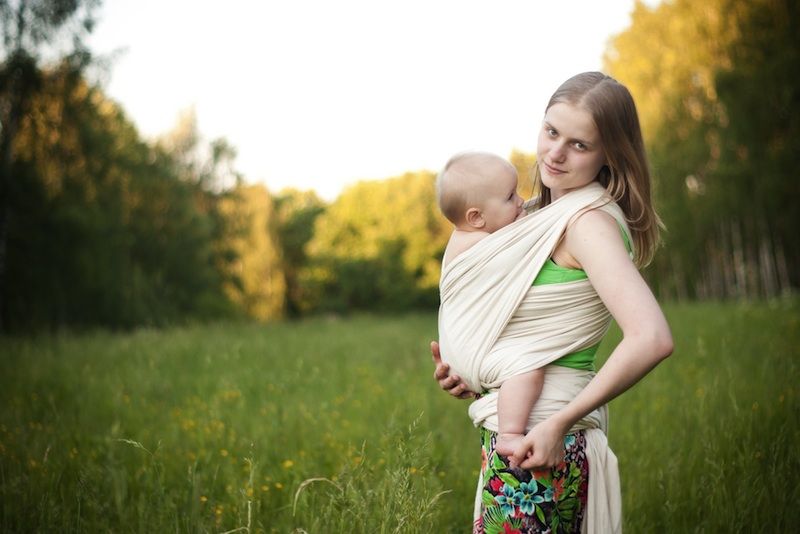What Feminists Really Think About Parenting

Feminists get a bad rap for being anti-family and anti-baby. But a new study finds that feminist women are actually more likely than non-feminist sorts to support intensive parenting styles.
Women who identify themselves as feminists show more support than non-feminists for the tenants of attachment parenting, the new research found. Attachment parenting is a time-intensive parenting style involving long-term breast-feeding, co-sleeping, frequent carrying of the baby and following the child's schedule instead of setting strict times for sleep and feeding.
(Though not defined in the study, broadly speaking, feminists are supporters of women's rights and gender equality.)
"Attachment parenting is this paradoxical mix where it has a lot of components that are appealing to feminists, but also has a thread to it that is not feminist and has some regressive components," said study researcher Miriam Liss, a psychologist at the University of Mary Washington in Virginia.
"Women are grappling with both sides of the issue," Liss told LiveScience
Feminist moms
Surveys of American undergraduates — a common and convenient population for psychologists to research — have shown that feminists are generally viewed to be career-oriented and man-hating. But stereotypes can be misleading: A study of feminist attitudes toward men published in the journal Psychology of Women Quarterly in 2009 found that feminists were actually less hostile toward men than non-feminists. [6 Gender Myths Busted]
Sign up for the Live Science daily newsletter now
Get the world’s most fascinating discoveries delivered straight to your inbox.
Liss wanted to look at the perceptions versus the realities of feminist parenting. Certain "Earth-mother" components of attachment parenting are very attractive to feminists, Liss said. It's an anti-materialist, non-consumerist philosophy. But attachment parenting focuses on breast-feeding, which puts a larger time burden on the mother, and goals like frequently wearing your infant in a sling aren't easy to meet for working moms.
Liss and her colleague Mindy Erchull recruited women, both mothers and non-mothers, through feminist blogs, "mommy blogs" and Craigslist. The women self-identified as either feminist or non-feminist. The final study group included 147 feminist moms, 75 feminists without children, 143 non-feminist moms, and 66 non-feminists without children.
Each participant filled out an online survey with information on her age, race, education and other demographic factors as well as her own attitude toward four parenting issues: breast-feeding, co-sleeping (or sleeping in the same bed with your infant), frequent carrying of the baby and setting strict schedules for sleep and feeding. The first three methods are tenants of attachment parenting, while strict scheduling is frowned upon by attachment adherents.
The participants were then told to answer the same questions, but this time to answer from the perspective of a "typical feminist woman."
Mothering misconceptions
The answers turned up a disconnect between how feminists are viewed and what they believe. Non-feminist mothers saw themselves as more interested in breast-feeding and child-carrying and less interested in strict schedules than feminist moms, when in fact the opposite was true for each. Non-feminist non-mothers also saw themselves as more interested in breast-feeding than feminists, another misconception.
In fact, feminists supported breast-feeding, child-carrying and co-sleeping more than non-feminists, regardless of whether they had kids; and feminists were less supportive of strict schedules for infants compared with non-feminists. The results, reported June 3 in the journal Sex Roles, held when researchers controlled for age, education and socioeconomic status. [The Facts on Moms & Breast-Feeding (Infographic )]
The study was limited to heterosexual, mostly white and well-educated women, so it may not reflect all feminists or all demographics. But the findings are interesting, the researchers wrote, given public debate over whether attachment parenting is "feminist." This debate has played out in the New York Times, in a "Room for Debate" piece from May 2012 and in the Wall Street Journal, in a 2010 article by feminist novelist Erica Jong comparing time-intensive attachment parenting to a "prison for mothers." More recently, Time magazine stirred the attachment parenting pot when it featured on its May 2012 cover a 26-year-old mom breast-feeding her 3-year-old son.
Liss said she can't speak to whether attachment parenting is a feminist act or a good way to parent. But the rise of attachment parenting and feminism may be tied, she said, with rising social status and expectations for achievement among women translating to increasing interested in finding the "best" way to parent.
"I think women today face an awful lot of pressure and a lot of people telling them, 'This is the way you ought to do it,'" Liss said. "There are a lot of right ways to raise your kids."
Follow Stephanie Pappas on Twitter @sipappas or LiveScience @livescience. We're also on Facebook & Google+.

Stephanie Pappas is a contributing writer for Live Science, covering topics ranging from geoscience to archaeology to the human brain and behavior. She was previously a senior writer for Live Science but is now a freelancer based in Denver, Colorado, and regularly contributes to Scientific American and The Monitor, the monthly magazine of the American Psychological Association. Stephanie received a bachelor's degree in psychology from the University of South Carolina and a graduate certificate in science communication from the University of California, Santa Cruz.